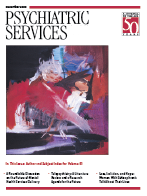Not since Kinney and Leaton (
1) published
Loosening the Grip: A Handbook of Alcohol Information has a substance abuse handbook appeared that can so readily be used as a resource by clinicians, consumers, and families alike. The book's preface reminds us that the treatment of substance abuse is in a precarious state: threatened by reductions in funding, suffering the effects of stigmatization, and running the risk of being treated like a stepchild in managed care systems. The authors elucidate the need for health care clinicians, mental health clinicians, members of the criminal justice system, consumers, and the public to understand the underlying principles of substance use disorders as well as the array of services and therapies currently available. This book was successfully designed to be read as a whole or to be referenced by chapter for specific topics of interest.
Substance Abuse is divided into eight parts containing 31 specific topic chapters. Parts 1 and 2 address the basic principles in substance abuse treatment and the major substances of abuse. The authors begin by clarifying the language of substance abuse, defining abuse, addiction, and so on. They review biological principles of addiction and explain brain functioning and neurotransmitters. The major substances of abuse are all addressed in terms of their history, effects, mechanism of action, withdrawal symptoms, and treatment. A synopsis of the lesser-known "club drugs," such as GHB and Rohypnol, is also included.
The neurobiology and the physiology of addiction can often be rather difficult to understand for the reader who does not have a medical background. I found that the chapters on these topics were clear and understandable. As for readers in the medical professions, the clear descriptions would lend themselves to use in individual patient education or didactic groups.
Parts 3, 4, and 5 address the treatment of substance use disorders from the initial interview through various treatment modalities, including individual, group, family, and pharmacological treatments. Types of treatment programs, such as the therapeutic community, and types of interventions, such as the state-of-the-art substance use "intervention," are also described.
Again, this book does not provide an extensive review of specific treatment modalities; rather, it is a primer for understanding the various treatment options available. I particularly value the authors' effort to explain the types of interviewing techniques that are most useful in evaluating the extent of substance use, and how these techniques differ from eliciting information in the evaluation of other medical and psychiatric conditions.
The authors present a model of change and recovery that "seeks to describe, as accurately as possible, the universal elements of addiction for all individuals who abuse substances." Although not based solely on Prochaska and associates' stages of change (
2), the authors' model is a variant of it that includes the phases of precontemplation, contemplation, and relapse prevention (maintenance). However, the authors jump from contemplation (stage 2, phase 2) to relapse prevention (stage 2, phase 3). This approach omits an action phase, which may leave the reader somewhat confused about when the work of moving into recovery takes place.
The final three parts of the book focus on policy issues, special populations, and commonly asked questions. In the area of co-occurring psychiatric and substance use disorders, the authors present a thorough discussion of differential diagnosis and primary versus secondary psychopathology. However, because the treatment of co-occurring disorders is a primary challenge in both the mental health and the substance abuse arenas today, I would have liked to see a greater focus on the treatment philosophy and treatment options currently available.
Substance Abuse is an excellent book. It is not only a good primer for beginning clinicians but also a very helpful book for those who practice in related fields such as primary care and the criminal justice system. I would not hesitate to recommend this book to clients and their families and to readers in the general public to help them work on issues of substance abuse themselves or to partner with professionals.

